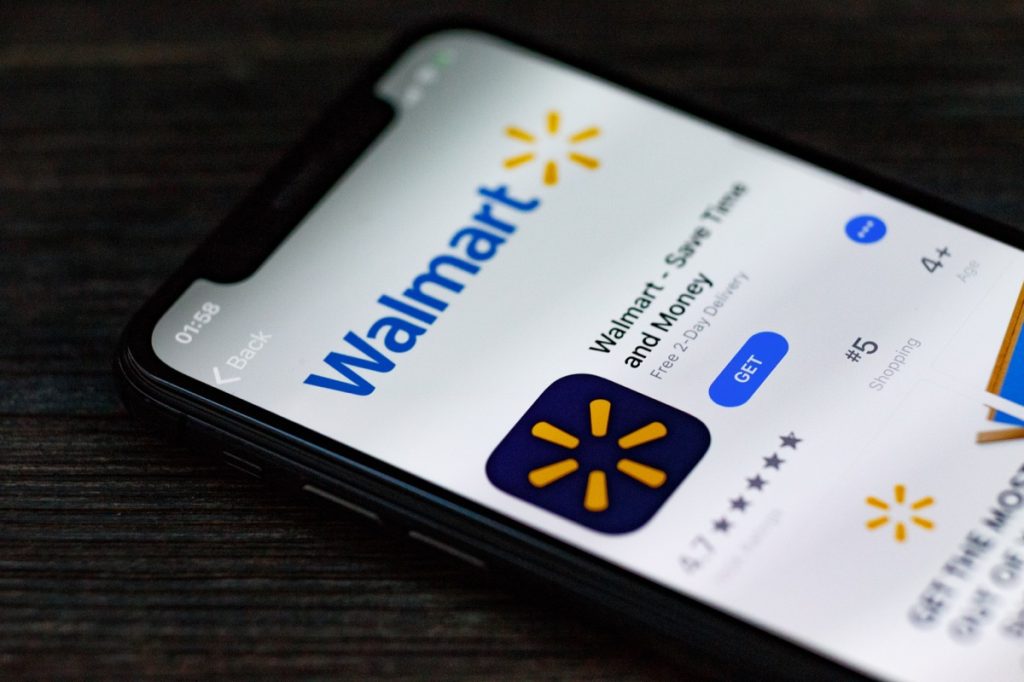Walmart Is Under Fire for Asking Shoppers to Do This: "Invasion of Privacy"
The iconic retailer is taking heat for a recently launched service.

No matter where you live in the U.S., there's likely a Walmart location near you. The megaretailer is a source of everything including groceries, home goods, electronics, clothing, and more for millions of Americans. But the unique relationship customers have with the company isn't without its rough patches, no matter how much some rely on the stores. And now, Walmart is coming under fire from shoppers after committing what they call an "invasion of privacy." Read on to see which new service has some devoted customers upset right now.
READ THIS NEXT: Walmart Shoppers Can Now Buy This "Award-Winning" Product in Stores.
This isn't the only time recently Walmart has faced scrutiny for its policies.

Thanks to its low prices and special perks for regular shoppers, Walmart has managed to warm up to millions of customers. But even though the company is regularly praised for many of its moves, there are some recent examples where consumers have called out the retailer for its policies and changes.
In June, the Federal Trade Commission (FTC) announced that it was suing Walmart for money transfer fraud, alleging that the company "turned a blind eye" to scammers using the store's money transfer services. Law enforcement investigations into the matter had found that criminals regularly transferred funds stolen through various schemes utilizing the system, all while the company was aware of the issue but neglected to warn customers. The lawsuit asked the court to order Walmart to return money to consumers, and "impose civil penalties for Walmart's violations" for the alleged $197 million in payments that were sent and received over the service between 2013 and 2018. The retailer pushed back, calling the lawsuit "factually misguided and legally flawed" and claiming that it had actually saved customers around $6 billion in fees "by bringing important competition to the money transfer industry."
Another lawsuit was filed against the company on Sept. 1 in a U.S. District Court for the Southern District of Illinois. In this case, plaintiff James Luthe alleged that Walmart was collecting, storing, and using customers' biometric data without their consent through their cameras and advanced video surveillance systems used in stores. Such action would violate the Illinois Biometric Information Privacy Act (BIPA) in 2008, which requires "entities, including employers, that collect biometric data to follow a number of protocols," per The National Law Review.
And now, the retailer finds itself in hot water with customers again.
Shoppers say this recently added Walmart feature is an "invasion of privacy."

Walmart is no stranger to providing technological advances to its customers to improve the shopping experience. In June, the store's app saw an update that allows shoppers to see how a piece of furniture will look in their home by using augmented reality (AR). On Sept. 15, the store took this feature even further with the launch of its "Be Your Own Model" experience, which "brings the in-store fitting room experience to online shoppers" by allowing them to "use their own photo to better visualize how clothing will look on them."
But while the new feature could make it easier for customers to spruce up their wardrobe, some have taken issue with the technology. Mainly, some shoppers have expressed concern that the app requires users to take a photo of themselves in their underwear or tight-fitting clothing for it to work correctly, The U.S. Sun reports.
"I think that's when they should've realized this wasn't a good feature," one Reddit user wrote in a thread discussing the update. "Fundamentally, it's bad because you can't make it work without an invasion of privacy."
RELATED: For more up-to-date information, sign up for our daily newsletter.
Some users fretted that their images could end up in the wrong hands.

Discussion over the new technology led to a heated debate among users on the technology subreddit over the potential implications.
"What happens if Walmart's servers get hacked and this data gets leaked?" one user questioned.
Others pointed out another potentially sensitive issue with the technology. "How do they stop children from using this feature? Especially if the photos are saved. This just seems like a bad idea to me," one user asked. Another called it a "dystopian, body-mapping nightmare" that might lead to the company showing you ads for "cures, weight loss pills, etc. Yikes."
Still, some users pushed back by citing how useful—and ultimately harmless—the added feature seemed to be. "Are people really acting surprised? How the [expletive] else would they show you how tight-fitting clothes look on you without it looking like your head superimposed on a Sims character?" one user argued. "If you're worried about some random Walmart employee seeing you in spandex (the kind lots of people wear publicly), don't use it."
Others pointed out that similar services are already available elsewhere. "Amazon shopping does this. It's awesome," one user replied. "I don't understand how you expect it to work without a pic of yourself. I found it to be amazing and pretty [expletive] accurate. Has saved me many needless returns."
Walmart says there are other ways to use the new feature without taking a photo of yourself.

While the online debate over the new feature continues, Walmart issued a response addressing some of the initial concerns.
"The technology powering the Be Your Own Model experience works best when customers are wearing tight-fitting clothing during the photo capture process," a company spokesperson told The U.S. Sun. "Customers can take photographs of themselves wearing a tank top, workout wear such as shorts, knee length leggings, or skin-colored long leggings."
"Walmart takes customer privacy very seriously. The app camera doesn't cache/store any images or metadata. Be Your Own Model files are encrypted at rest and in transit, and we ensure that users only have access to the images that they upload," the spokesperson assured.
The company also explained that it went to great lengths to protect its customer's personal information. "Our Information Security team's mission is to protect critical data through advanced innovation and technology to secure our environment. We focus on protecting our information and digital infrastructure through adherence to third-party standards, incident reporting policies and escalation practices, vulnerability testing, and continuous improvement," they told The U.S. Sun. "Be Your Own Model also went through rigorous administrative and technical control reviews to help ensure compliance with privacy laws and regulations."
Other users pointed out that those shopping for clothes from Walmart online also have the option of using the store's previously released "Choose My Model" feature. In place of a photograph, customers can instead choose one of 50 models that range in height and clothing sizes that most resemble their body shape.





















